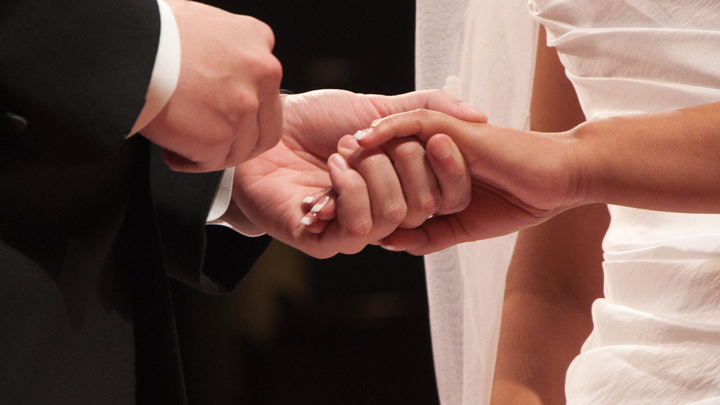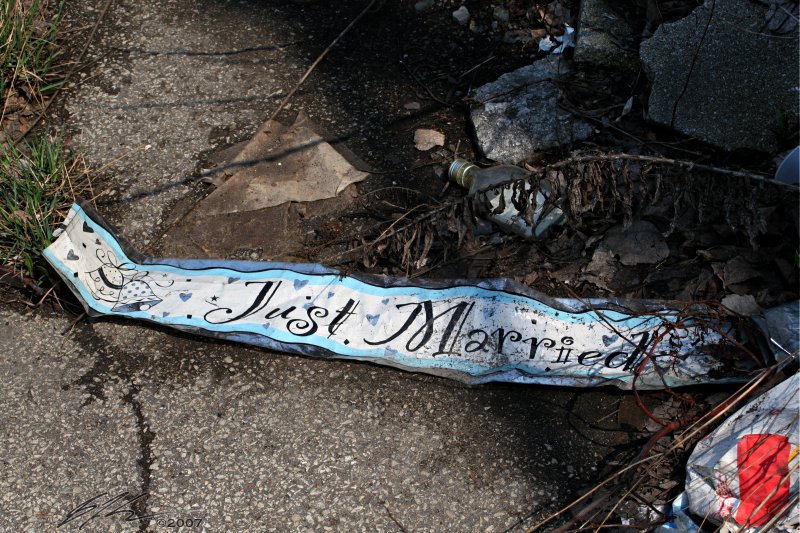Christian Diemer investigates the phenomenon of wedding agencies in Ukraine and quizzes young Europeans about their attitudes towards marriages where true love may not be the only motivating factor.
When I want to register at the Ukrainian wedding agency, my request is turned down. “You know Russian, you have been to Ukraine, you have a VK account [Russian social media]. Why would someone like you pay an agency to find him a Ukrainian wife? You can take every single Ukrainian girl from the street!”
I had imagined the job of a wedding agency to be somewhat different. More about connecting people who are explicitly willing, serious, and prepared to marry. Ideally, even particularly such people that promise to fit well with each other for a joint future for the rest of their lives. But according to the agency lady, all she does for her foreign clients is translating at the first date, hence no use for me.

The agency is said not to be a complete hoax. The woman are real and have registered on the site of their own free will – I am loosely acquainted with some of them. The agency owner recruited them right after their graduation from university. So far, however, those I know have never been contacted by a single foreigner. And over the course of time, they themselves may have forgotten about their registration. Some may have started to sift through acquaintances’ friend lists on social media, looking for western Europeans to start chatting with. Some may have left Ukraine to work as an au-pair, determined to eventually find some western European man to take them. Some in the meantime may be happily married to Ukrainian husbands, with wedding photos spread everywhere online, much to the fury of the agency owner.
The agency owner, as dubious as she is, doesn’t promise me the moon. Of course, she freely admits, the registered women are interested in a better life over there in Europe, more than in finding the love of their life. Quite understandably so, with an average salary of 150$, a crisis- and war-shaken economy and currency, and violence against women the sad companion of widespread alcoholism. At the same time, though, she claims, this doesn’t necessarily exclude the possibility that sincere feelings may come into being as well.
I wonder how this will actually work out in practice, from the moment on when the agency lady won’t be there anymore to help with translation. The women are said to have higher education, but hardly any knowledge of English. And the fact that I know Russian and am familiar with Ukrainian culture paradoxically seems to rather disqualify me as a potential client of the agency. What does such an arranged first date look like? And what about the relationship afterwards, if there is any? How often does it work out? And if so, in what way, and for whom? For the agency lady’s wallet, for the European sex tourist, for the Schengen surfer – or for the descendants of a long-lasting, happy western European-Ukrainian partnership of mutual respect and fidelity?
The issue is contested anyway. Leaving aside the abundance of brute online frauds, one hears stories about well-educated Ukrainian girls ending up as toilet-cleaners and sex slaves in their western European husbands’ businesses – but there also seem to be happy intercultural couples that have found each other with the help of wedding agencies, have children, live a wealthy, happy, respectful life somewhere over there, even seem to have fallen in love with each other.
What are we actually dealing with in the case of agency-arranged weddings? Are we talking about sham marriage, a criminal offence to undermine and abuse state-regulated migration policies? Human-trafficking, sex tourism, prostitution even, albeit in a seemingly more distinguished form: money for mummy, passport for pussy?
Or is this just a more pragmatic, modest approach towards finding a companion for life? What, theoretically speaking, should speak against matching two people from different countries, for their mutual benefit, so that they can give to each other exactly what they lack in their original surroundings? Can such an arranged marriage potentially even be the fundament to a sustainable relationship, set free from the chimera of romantic love, passion, and eros – that, as one could argue, turns into delusion and hurt feelings sooner or later anyway, something we’ve probably all experienced and yet from which we still stubbornly refuse to learn any lessons? This last point overlaps with more general questions: is it acceptable to use algorithms to find love? Can intercultural relationships, be they arranged or spontaneous, work out at all, especially if there is a difference in economic status? Is there any moral justification for marrying someone in order that they are able to come to or remain in a country of their choosing?
Seeking, if not quite answers, then at least a sense of the Millennial Generation’s attitudes towards such considerations, E&M got young people in both Ukraine and Western Europe to weigh in on the matter. Their responses are, as you can see, speculative and varied, but one thing unites them all: a focus on the wellbeing and security of the parties involved in a marriage or relationship of questionable sincerity.
Dariya, 26, from Ivano-Frankivs’k, western Ukraine, has had a Greek and a Dutch boyfriend:
“For a woman, a credit card can replace all lovers. Show me at least one who would refuse to have such life – nobody, including me. I personally don’t believe in a credit card and shoes and such things. I know many ways how to spend the money. There are so many things to explore. I think that if I had more money it would give me more opportunities. Not in terms of having ten thousand pairs of new shoes. No, about traveling the world and meeting new people. Having a good education. Having my own business. I am not the lazy bones who doesn’t want to do a thing in life and just have everything on a saucepan with a golden trim.

If you fall in love with someone and he turns out to be rich it’s one thing. But when you hunt just for money it’s another thing. I wouldn’t say it is morally bad. It’s just some people are searching for easy access to everything. Easy money attracts them. It has always been like this, nothing new.
Most Ukrainian girls search for easy money, a European passport, any opportunity to be closer to the Western world. They would do a lot and even more for it. I don’t say it’s good or bad. But because of such girls, foreigners think that this is the normal behaviour of every girl over here, and for a glass of juice you will suck his penis. I have had such situations many times, when a guy looks at you like you are a piece of meat, and you have to be thankful that such person is standing next to you. And later on he says, ‘Come on, you are Ukrainian, here are all the same. Come to my hotel. What’s the problem? Maybe you want a glass of beer?’ Pfff, that’s disgusting. And in five minutes there are already other girls who hug him. So, what can I prove anyway!
And later on they all come here for the cheap sex, which costs one glass of beer. I don’t want to praise myself, or say I am not like that. But if I jump in a bed, then it’s really something serious for me.
So there are many characters and many people with their own view on life. But what I personally think about Ukrainian women is that they are very beautiful, but they don’t respect themselves. And how can someone respect them, if they don’t respect themselves.”
Chris, 30, American, living in Germany, has had two Ukrainian girlfriends:
“If one knew that sincerity was involved on the part of the woman, an agency-arranged marriage would be one thing. However, the whole set-up makes it pretty much obvious that that wouldn’t ever be the case. Either it would be outright deception, or at least rationalisation, somewhere along the lines of: ‘Yeah, well, I can maybe get a resident’s permit for Germany, so I guess it must be love.” Of course, knowing this would make an emotional investment on my part pretty much impossible, or, if so, really stupid.
So I don’t see myself making use of agencies for the purpose of establishing a relationship. Possibly to get some nice and willing Ukrainian pussy and make use of the willingness to engage in kinky sexual acts – which would be fine, since they are being provided for the only reason of achieving residency. This is known, of course, as prostitution. But if the guy, the poor bastard, is being screwed over without any regard for his emotional wellbeing, I don’t see the problem with screwing over the gold-digging bitches. I guess the only problem with that is not being able to be certain whether the woman’s motives are deceitful or not. So if you have any sort of moral code, it’d probably be better to steer clear of the whole deal, or risk getting screwed over. I know I probably couldn’t handle the uncertainty one way or the other.

Actually, it would probably be better for all involved if the thing worked like actual prostitution does: there’d be a contract for a specific service, provided for a certain fee. Without that it’s just always going to be nasty lies at one or the other’s expense.”
Madeline, 26, from the UK, living in Berlin, has a German boyfriend:
“Given that I am neither man seeking an exotic wife, nor a woman looking for a way out of an unfavourable situation in my native land, I don’t suppose I’m really the target audience for this kind of intercultural ‘match-making’ service.
However, I don’t find the idea inherently bad either, so long as both people involved are willing and fully aware of what they’re letting themselves in for. Certainly, as I am not a religious person, arguments about the sanctity of marriage as an institution of God do not particularly move me. What’s more, given the importance of companionship within any marriage, I would have thought that friendship is just as important as erotic love in a couple’s being able to make a successful go of things, paving the way, perhaps, for the possibility of a ‘platonic marriage’ as a perfectly valid form of union. So I wouldn’t feel that a couple should be disqualified from marriage, simply because they’re not absolutely besotted with one another.

In principle, in fact, I would like think that if a friend of mine were in really dire straights – faced with deportation or something similarly life-changing – and I wasn’t ‘otherwise engaged’ in a relationship with someone else, I would be prepared to help him out and ensure that he were able to stay in the country he had decided to call home. I definitely wouldn’t do it for money or for a stranger to me, only for reasons of real and abiding friendship. That said though, in all honesty I’m not sure I would actually be able go through with such a marriage. I’m a worrier, you see, not to mention a colossal goody two-shoes, and I suspect that in the end, I would chicken out, worn down by my own concerns about what the authorities might do, were they to discover the truth.”
Manuel, 24, German, has a Moldovan girlfriend:
“I could never imagine to be in agency-arranged or faked marriage with a partner from Ukraine or elsewhere. The reason is simple – I would feel uncomfortable and could never be sure whether my partner is really caring and trustful towards me, or only pretending. Also the arranged marriages I have seen so far in my environment felt strange to me most of the time.
From a moral point of view I wouldn’t judge most arranged marriages as long as the partners are on the same level. The problem about a relationship is always when at least one person is trying to exploit his or her partner – which is logically more likely in arranged marriages. In such a constellation, both partners need to actively try and develop a normal relationship, or be aware of the risk that the marriage will never work out.
Moreover, I would consider an arranged marriage morally acceptable provided that both partners agree on the specific circumstances. Both need to be aware that the person from Ukraine will mostly be driven by economic motives, whereas for the person from a wealthier western country it will mostly be the desire to get love and acceptance from a female person. Once this is clear and mutually agreed on, it is definitely an advantage and can even be a win-win situation.

On the other hand, society will definitely judge you. Arranged marriages have a bad reputation in western societies, and it can be problematic to make one known among family and friends. But again, I would say this can work out given the arranged marriage itself is working out and thus comes natural to your relatives as well.
If I were in such an arranged marriage I would probably be open about it, even taking the risk to be judged negatively by friends and relatives. But I couldn’t live keeping this behind the curtains, with rumours about my relationship spreading anyway. I would try to reduce rumours to a minimum since they as well could affect my relationship negatively.
I happen to be in a (non-arranged!) relationship with a girl from Eastern Europe, and I have definitely experienced some prejudice. But mostly it dissolved right after people met my girlfriend in person, more than that, they even turned through 180 degrees. I never perceived these initial stereotypes as painful, since nobody really stuck to them or was really being judgemental. It seems to be the nature of society to question unknown or uncommon relationship situations.”
Pol, 30, from Catalonia, living in Munich, has a German boyfriend:
“I find it very hard to come up with an opinion on the topic, and I possibly have more questions than answers. But I think it all depends on each case. I understand some marriages are arranged as a getaway from their country, be it as a result of a specific threat to their wellbeing or just to look for a better future. There is also the element of an arranged marriage as a traditional practice, something that feels so alien to us in Western countries.
Taking as an example the case of a Ukrainian woman looking for an arranged marriage in the West, I would say the most important thing is consent. Of course, I understand in some cases the situation can be delicate and urgent, but we should also question whether the West is going to offer something much better. What I mean is that, in theory, for them to come to countries in the West and marrying a heterosexual man might seem to be a salvation, but there are so many ways I can think of in which this could go wrong, leaving them without protection. For that reason, I think it should be ensured that these women will be safe and also be able to adapt to their new life.

I personally would not engage in such an arranged marriage. It has nothing to do with moral reasons, but I believe that the way of helping these people should be through structural changes in their home country. That is, creating social pressure against governments and working together so that they don’t feel forced to leave their country, but rather have it as an option.”
Cover photo: Parekh Cards (Flickr); Licence: CC BY-SA 2.0










